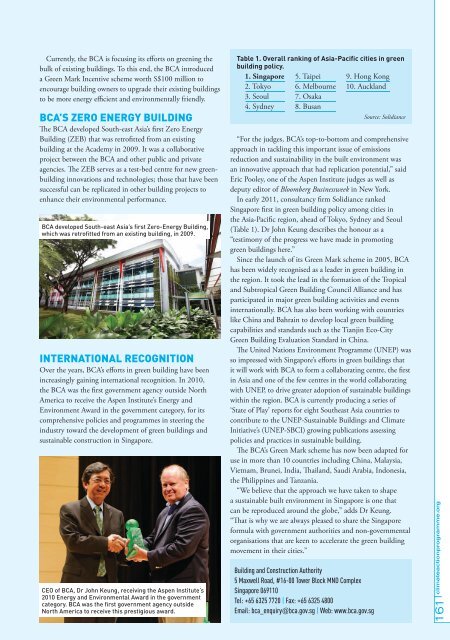Climate Action 2011-2012
You also want an ePaper? Increase the reach of your titles
YUMPU automatically turns print PDFs into web optimized ePapers that Google loves.
CA<strong>2011</strong> Exxaro_3.pdf<br />
Currently, the BCA is focusing its efforts on greening the<br />
bulk of existing buildings. To this end, the BCA introduced<br />
a Green Mark Incentive scheme worth S$100 million to<br />
encourage building owners to upgrade their existing buildings<br />
to be more energy efficient and environmentally friendly.<br />
BCa’S Zero energy Building<br />
The BCA developed South-east Asia’s first Zero Energy<br />
Building (ZEB) that was retrofitted from an existing<br />
building at the Academy in 2009. It was a collaborative<br />
project between the BCA and other public and private<br />
agencies. The ZEB serves as a test-bed centre for new greenbuilding<br />
innovations and technologies; those that have been<br />
successful can be replicated in other building projects to<br />
enhance their environmental performance.<br />
BCA developed South-east Asia’s first Zero-Energy Building,<br />
which was retrofitted from an existing building, in 2009.<br />
international reCognition<br />
Over the years, BCA’s efforts in green building have been<br />
increasingly gaining international recognition. In 2010,<br />
the BCA was the first government agency outside North<br />
America to receive the Aspen Institute’s Energy and<br />
Environment Award in the government category, for its<br />
comprehensive policies and programmes in steering the<br />
industry toward the development of green buildings and<br />
sustainable construction in Singapore.<br />
CEO of BCA, Dr John Keung, receiving the Aspen Institute’s<br />
2010 Energy and Environmental Award in the government<br />
category. BCA was the first government agency outside<br />
North America to receive this prestigious award.<br />
Table 1. Overall ranking of Asia-Pacific cities in green<br />
building policy.<br />
1. Singapore 5. Taipei 9. Hong Kong<br />
2. Tokyo 6. Melbourne 10. Auckland<br />
3. Seoul 7. Osaka<br />
4. Sydney 8. Busan<br />
Source: Solidiance<br />
“For the judges, BCA’s top-to-bottom and comprehensive<br />
approach in tackling this important issue of emissions<br />
reduction and sustainability in the built environment was<br />
an innovative approach that had replication potential,” said<br />
Eric Pooley, one of the Aspen Institute judges as well as<br />
deputy editor of Bloomberg Businessweek in New York.<br />
In early <strong>2011</strong>, consultancy firm Solidiance ranked<br />
Singapore first in green building policy among cities in<br />
the Asia-Pacific region, ahead of Tokyo, Sydney and Seoul<br />
(Table 1). Dr John Keung describes the honour as a<br />
“testimony of the progress we have made in promoting<br />
green buildings here.”<br />
Since the launch of its Green Mark scheme in 2005, BCA<br />
has been widely recognised as a leader in green building in<br />
the region. It took the lead in the formation of the Tropical<br />
and Subtropical Green Building Council Alliance and has<br />
participated in major green building activities and events<br />
internationally. BCA has also been working with countries<br />
like China and Bahrain to develop local green building<br />
capabilities and standards such as the Tianjin Eco-City<br />
Green Building Evaluation Standard in China.<br />
The United Nations Environment Programme (UNEP) was<br />
so impressed with Singapore’s efforts in green buildings that<br />
it will work with BCA to form a collaborating centre, the first<br />
in Asia and one of the few centres in the world collaborating<br />
with UNEP, to drive greater adoption of sustainable buildings<br />
within the region. BCA is currently producing a series of<br />
‘State of Play’ reports for eight Southeast Asia countries to<br />
contribute to the UNEP-Sustainable Buildings and <strong>Climate</strong><br />
Initiative’s (UNEP-SBCI) growing publications assessing<br />
policies and practices in sustainable building.<br />
The BCA’s Green Mark scheme has now been adapted for<br />
use in more than 10 countries including China, Malaysia,<br />
Vietnam, Brunei, India, Thailand, Saudi Arabia, Indonesia,<br />
the Philippines and Tanzania.<br />
“We believe that the approach we have taken to shape<br />
a sustainable built environment in Singapore is one that<br />
can be reproduced around the globe,” adds Dr Keung.<br />
“That is why we are always pleased to share the Singapore<br />
formula with government authorities and non-governmental<br />
organisations that are keen to accelerate the green building<br />
movement in their cities.”<br />
Building and Construction Authority<br />
5 Maxwell Road, #16-00 Tower Block MND Complex<br />
Singapore 069110<br />
Tel: +65 6325 7720 | Fax: +65 6325 4800<br />
Email: bca_enquiry@bca.gov.sg | Web: www.bca.gov.sg<br />
161 climateactionprogramme.org












